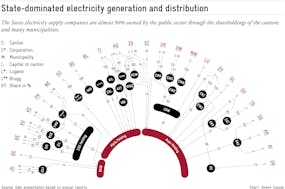In February, government officials and the public were relieved to find that European countries were back on the track towards economic growth. The growth rate is expected to be 1.6% in 2017, and it is expected to increase to 1.8% in 2018. In the case of Greece, where the lack of financial discipline has been of concern to Europe, the growth is estimated to be 2.7% in 2017 and 3.1% in 2018.
Switzerland also is expected to experience ongoing economic recovery in the years ahead. The State Secretariat for Economic Affairs (SECO) has predicted moderate growth in 2017 and 2018, i.e., 1.8 and 1.9%, respectively. Even so, the results of the Brexit negotiations still remain unclear, and the United States has threatened to introduce customs duties. Such duties could constitute an increased impediment to trade, and exports to Germany and Switzerland could be particularly affected. It is important to note that, at the present time, the United States and Europe are no longer the main driving forces of the world economy; the Asian countries have taken over that role. Growth momentum in Switzerland and other western industrialized countries is not nearly as dynamic as it is in Asia. For China alone, the Organization for Economic Co-operation and Development (OECD) forecasts a growth rate of 6.4% for 2017, and above-average growth also is expected in Vietnam. After the U.S. President ordered the withdrawal of the U.S. from the Trans-Pacific Partnership (TPP), Asian countries now have other options to pursue their economic development.

The Swiss agricultural lobby is firmly opposed to a foreign trade agreement with Indonesia and protects the production of Swiss canola oil. (Wikimedia Commons)
The Regional Comprehensive Economic Partnership (RCEP) is a trade agreement that is being developed among the 10 member states of the Association of Southeast Asian Nations (ASEAN) and China, Australia, India, Japan, South Korea, and New Zealand. In Europe things are quite different because the reinforcement of the internal market was interrupted abruptly by the British decision to leave the European Union (EU). At the same time, demonstrations in Europe and the United States have shown the existence of some hostility towards free-trade agreements. In the United States, a protectionist era has begun, as evidenced by the slogan “buy American and hire American.” The medium-term consequences of such a policy could be detrimental for U.S. consumers because local products will become more expensive. However, the leaders of the Asian zone expect the RCEP to result in substantial development of free trade in goods and services and improved protection of investments and intellectual property. The RCEP will be one of the largest economic organizations in the world, with 16 member states, 3.5 billion people, and $22,397 billion in gross domestic product, which comprises almost 30% of all world trade.
Switzerland should consider keeping the door open to this dynamic because its prosperity is dependent somewhat on Swiss companies’ access to foreign markets. In Switzerland, the mechanical, electronics, and metal industries employ 320,000 people, making these industries the largest employers in the country. The leaders of these companies have expressed their concern about the possibility of restricted access to the U.S. market because of high customs duties. The U.S. is the second largest market after Europe. If the U.S. market were to become more difficult to access, Switzerland undoubtedly would turn its attention to the immense potential for free trade agreements with the rapidly-growing Asian markets. Such agreements could include the abolition of customs duties and other norms and standards based on joint agreements.
There are opportunities that could be pursued with Vietnam, Thailand, Malaysia, and Indonesia. However, the Swiss agricultural lobby is strongly opposed to a free-trade agreement with Indonesia. This opposition is based on the desire to protect Swiss canola oil from competition by Indonesian palm oil. Switzerland must evaluate whether it is in the country’s best interests from an economic perspective to renounce the emerging Asian markets to protect Swiss canola oil at the price of penalizing many other economic sectors. As a reminder, the share of canola oil represents only 0.2% of Switzerland’s global GDP.
This article was published on March 6, 2017, in the “Luzerner Zeitung” and the “St. Galler Tagblatt.”





